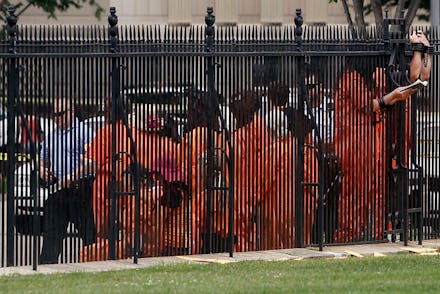Guantánamo Bay is a Hellish Prison, That America Conveniently Tries to Forget

Ever since the War on Terror began over 10 years ago, the term “national security” has been so overused it has lost its value. Defense attorneys for five detainees at Guantanamo Bay have requested that the Guantánamo war crimes tribunal allow the defendants to narrate their ongoing treatment at the facility. The tribunal continues to ban inmates from discussing details of alleged prisoner abuse; the tribunal claims this would pose a threat to national security.
A large amount of concrete evidence exists that Guantánamo prison is a hellish residence for its occupants. Nevertheless, dozens of inmates continue to remain at the facility, even though many were never charged with a crime or were cleared for release. In protest, many commenced a hunger strike to bring attention to their dire situation, only to be denied the right by being force fed through a procedure that is nothing less than brutal.
President Obama, who finally called it quits on the facility in 2009, has yet to fulfill his prolonged promise. Regrettably, innocent civilians continue to endure the harsh reality of political malpractice in prison camps that are anything but optimal.
Guantánamo prison has gained extensive notoriety for its treatment of inmates. Current and past prisoners have reported a range of adverse and harmful behaviour that they have experienced at the hands of their captors. Former captive Moazzem Begg recently recounted his experiences in the facility. According to Begg, “Everybody who’s been held in Guantanamo has been tortured or abused in one way.” He described his first experience as the most torturous. He claims he was cavity searched, punched, kicked and spat on. Even worse, prison officials tricked Begg into thinking his wife was being tortured..
“The worst sort of torture is the psychological, of course, [the] sort in which you are in solitary confinement torture unable to know what you have done for which you’re paying the ultimate price which is your freedom,” he said.
Of over 150 prisoners that Guantánamo currently houses, none have seen an impartial trial. Most inmates have either never been charged with an offense, or have been cleared for release. Unfortunately, their plight has gone mostly unnoticed.
In order to bring attention to their deteriorating conditions, many prisoners started a hunger strike earlier this year. In order to avoid a public relations disaster, the U.S. government decided to force feed prisoners who were not eating.
Sami-Al-Hajj, a former Sudanese prisoner at Guantánamo described force feeding as “painful in every sense of the word.” He added that “...I died twice every day during the force-feeding." He was held at Guantánamo for nearly seven years until his release in 2008.
Earlier this year, force feeding continued for Muslim prisoners who were observing Ramadan. While the activity was halted for the period of the fast, it continued during the night, when observers of Ramadan are allowed to eat. This meant many prisoners were fed twice in a shorter time frame than usual. This made the experience worse for prisoners, with some complaining of feeling exhausted and sick.
The U.S. political establishment continues to block any efforts to close the facility. A fresh plea by President Obama was rejected by the House of Representatives in July. Proponents of Guantánamo vehemently argue that transferring prisoners to U.S. soil would only embolden terrorists and make civilian neighbourhoods a target for attacks.
Yet notorious criminals such as Ramzi Yousef, the mastermind of the 1993 World Trade Center bombing, is currently being held in Florence, Colorado, and has been since 1998. No reported attack has ever taken place or been planned near the site of his captivity.
In light of recent events, public pressure is mounting to shut down Guantánamo. Nevertheless, the U.S. political establishment seems more concerned with scoring political points than tending to the vast list of abuse or torture techniques prisoners continue to face. Former Foreign Secretary Colin Powell said it best when he described the legacy of Gitmo in the following words: "If it were up to me I would close Guantánamo not tomorrow but this afternoon... Essentially, we have shaken the belief that the world had in America's justice system... and it's causing us far more damage than any good we get from it."